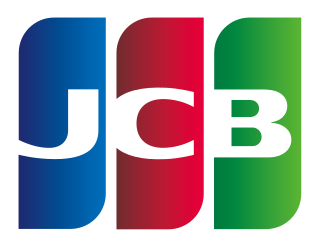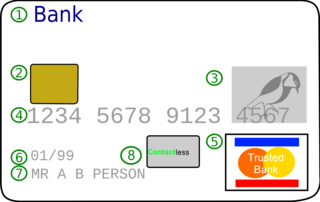
A debit card, also known as a check card or bank card, is a payment card that can be used in place of cash to make purchases. The term plastic card includes the above as well as an identity document. The card usually consists of the bank's name, a card number, the cardholder's name, and an expiration date, on either the front or the back. Many of the new cards now have a chip on them, which allows people to use their card by touch (contactless), or by inserting the card and keying in a PIN as with swiping the magnetic stripe. These are similar to a credit card, but unlike a credit card, the money for the purchase must be in the cardholder's bank account at the time of the purchase and is immediately transferred directly from that account to the merchant's account to pay for the purchase.

Electronic funds transfer at point of sale is an electronic payment system involving electronic funds transfers based on the use of payment cards, such as debit or credit cards, at payment terminals located at points of sale. EFTPOS technology was developed during the 1980s.

Visa Inc. is an American multinational financial services corporation headquartered in San Francisco, California. It facilitates electronic funds transfers throughout the world, most commonly through Visa-branded credit cards, debit cards and prepaid cards. Visa is one of the world's most valuable companies.

A charge card is a type of credit card that enables the cardholder to make purchases which are paid for by the card issuer, to whom the cardholder becomes indebted. The cardholder is obligated to repay the debt to the card issuer in full by the due date, usually on a monthly basis, or be subject to late fees and restrictions on further card use. Charge cards are distinct from credit cards in that credit cards are revolving credit instruments that do not need to be paid in full every month and a balance may be carried over, on which interest is paid. Charge cards are typically issued without spending limits, whereas credit cards usually have a specified credit limit that the cardholder may not exceed. Most charge cards are held by businesses, corporations or executives thereof, and are issued to customers with a good or excellent credit score.

Mastercard Inc. is the second-largest payment-processing corporation worldwide. It offers a range of financial services. Its headquarters are in Purchase, New York. Throughout the world, its principal business is to process payments between the banks of merchants and the card-issuing banks or credit unions of the purchasers who use the Mastercard-brand debit, credit and prepaid cards to make purchases. Mastercard has been publicly traded since 2006.

EMV is a payment method based on a technical standard for smart payment cards and for payment terminals and automated teller machines which can accept them. EMV stands for "Europay, Mastercard, and Visa", the three companies that created the standard.

Solo was a debit card in the United Kingdom introduced as a sister to the then existing Switch. Launched on 1 July 1997, by the Switch Card Scheme, it was designed for use on deposit accounts, as well as by customers who did not qualify for a Switch card on current accounts, such as teenagers. The Solo card scheme was decommissioned permanently on 31 March 2011.

JCB Co., Ltd., formerly Japan Credit Bureau, is a credit card company based in Tokyo, Japan. It is accepted at JCB merchants, and has strategic alliances with Discover Network merchants in the United States, UnionPay merchants in China, American Express merchants in Canada, and RuPay merchants in India.
Secure Electronic Transaction (SET) is a communications protocol standard for securing credit card transactions over networks, specifically, the Internet. SET was not itself a payment system, but rather a set of security protocols and formats that enabled users to employ the existing credit card payment infrastructure on an open network in a secure fashion. However, it failed to gain attraction in the market. Visa now promotes the 3-D Secure scheme.

Visa Debit is a major brand of debit card issued by Visa in many countries around the world. Numerous banks and financial institutions issue Visa Debit cards to their customers for access to their bank accounts. In many countries the Visa Debit functionality is often incorporated on the same plastic card that allows access to ATM and any domestic networks like EFTPOS or Interac.

Carte Bleue was a major debit card payment system operating in France. Unlike Visa Electron or Maestro debit cards, Carte Bleue transactions worked without requiring authorization from the cardholder's bank. In many situations, the card worked like a credit card but without fees for the cardholder. The system has now been integrated into a wider scheme called CB or carte bancaire. All Carte Bleue cards were part of CB, but not all CB cards were Carte Bleue.
3-D Secure is a protocol designed to be an additional security layer for online credit and debit card transactions. The name refers to the "three domains" which interact using the protocol: the merchant/acquirer domain, the issuer domain, and the interoperability domain.
An acquiring bank is a bank or financial institution that processes credit or debit card payments on behalf of a merchant. The acquirer allows merchants to accept credit card payments from the card-issuing banks within a card association, such as Visa, MasterCard, Discover, China UnionPay, American Express.
Authorization hold is a service offered by credit and debit card providers whereby the provider puts a hold of the amount approved by the cardholder, reducing the balance of available funds until the merchant clears the transaction, after the transaction is completed or aborted, or because the hold expires.

Interchange fee is a term used in the payment card industry to describe a fee paid between banks for the acceptance of card-based transactions. Usually for sales/services transactions it is a fee that a merchant's bank pays a customer's bank.
The Payment Card Industry Data Security Standard is an information security standard used to handle credit cards from major card brands. The standard is administered by the Payment Card Industry Security Standards Council, and its use is mandated by the card brands. It was created to better control cardholder data and reduce credit card fraud. Validation of compliance is performed annually or quarterly with a method suited to the volume of transactions:
A Merchant Category Code (MCC) is a four-digit number listed in ISO 18245 for retail financial services. An MCC is used to classify a business by the types of goods or services it provides.

A credit card is a payment card issued to users (cardholders) to enable the cardholder to pay a merchant for goods and services based on the cardholder's accrued debt. The card issuer creates a revolving account and grants a line of credit to the cardholder, from which the cardholder can borrow money for payment to a merchant or as a cash advance. There are two credit card groups: consumer credit cards and business credit cards. Most cards are plastic, but some are metal cards, and a few gemstone-encrusted metal cards.
Card schemes are payment networks linked to payment cards, such as debit or credit cards, of which a bank or any other eligible financial institution can become a member. By becoming a member of the scheme, the member then gets the possibility to issue cards or acquire merchants operating on the network of that card scheme. UnionPay, Visa and MasterCard are three of the largest global brands, known as card schemes, or card brands. Billions of transactions go through their cards on a yearly basis.

A card security code is a series of numbers that, in addition to the bank card number, is printed on a card. The CSC is used as a security feature for card not present transactions, where a personal identification number (PIN) cannot be manually entered by the cardholder. It was instituted to reduce the incidence of credit card fraud.













